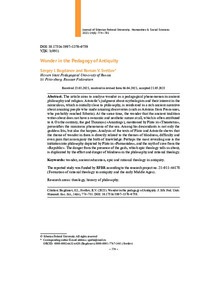Wonder in the Pedagogy of Antiquity
Скачать файл:
URI (для ссылок/цитирований):
https://elib.sfu-kras.ru/handle/2311/141344Автор:
Bogdanov, Sergey I.
Svetlov, Roman V.
Богданов, С. И.
Светлов, Р. В.
Дата:
2021-06Журнал:
Журнал Сибирского федерального университета. Гуманитарные науки. Journal of Siberian Federal University. Humanities & Social Sciences; 2021 14 (6)Аннотация:
The article aims to analyse wonder as a pedagogical phenomenon in ancient philosophy and religion. Aristotle’s judgment about mythologists and their interest in the miraculous, which is initially close to philosophy, is reinforced in a rich ancient narrative about amazing people who made amazing discoveries (such as Aristeas from Proconnes, who probably reached Siberia). At the same time, the wonder that the ancient tradition writes about does not have a romantic and aesthetic nature at all, which is often attributed to it. On the contrary, the god Thaumas («Amazing»), mentioned by Plato in «Theaetetus», personifies the numinous phenomena of the sea. Among his descendants is not only the goddess Iris, but also the harpies. Analysis of the texts of Plato and Aristotle shows that the theme of wonder in them is directly related to the themes of blindness, difficulty and even pain that accompany the birth of knowledge. Perhaps the most revealing one is the initiation into philosophy depicted by Plato in «Parmenides», and the myth of cave from the «Republic». The danger from the presence of the gods, which epic theology tells us about, is duplicated by the effort and danger of blindness in the philosophy and rational theology Статья имеет своей задачей проанализировать удивление как
педагогический феномен в античной философии и религии. Суждения Аристотеля
о мифологах и их изначально родственном философии интересу к удивительному
получают подкрепление в богатом античном нарративе об удивительных людях,
совершивших удивительные открытия (как пример таковых Аристей из Проконнеса,
добравшийся, вероятно, до Сибири). Вместе с тем, удивление, о котором пишет
античная традиция, вовсе не имеет романтически-эстетической
природы, которую
ему часто приписывают. Напротив, бог Тавмант («Удивительный»), упоминаемый
Платоном в «Теэтете», олицетворяет собой нуминозные явления морской стихии. Среди
его потомков не только богиня-вестница
Ирида, но и гарпии. Анализ текстов Платона
и Аристотеля показывает, что тема удивления в их текстах прямо связана с темами
слепоты, трудности и даже боли, которые сопровождают рождение знания. Возможно,
наиболее показательным является посвящение в философию, изображенное Платоном
в «Пармениде», а также миф о пещере из диалога «Государство». Нуминозная
опасность от присутствия богов, о которой нам сообщает эпическая теология,
дублируется усилием и опасности слепоты в философии и теологии рациональной

